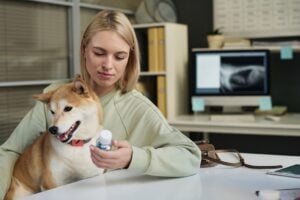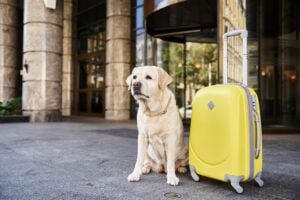7 Essential Dental Health Tips for Senior Pets Every Owner Should Know
Table of Contents
Your senior pet may be slowing down, but their dental health still needs to be up. In fact, as pets age, they’re more prone to gum disease, tooth decay, and oral infections, all of which can affect their overall health and comfort. If your dog or cat is over the age of seven, it’s time to prioritize their mouth as much as their joints or diet.
Here’s what every pet owner in Charlottesville should know about caring for a senior pet’s dental health.
Dental Risks in Senior Pets
- As pets age, plaque and tartar build up naturally. But without consistent dental care, this leads to periodontal disease, which affects more than 80% of dogs and cats over the age of three and gets worse with time.
Older pets also have:
- Weaker immune systems make it harder to fight oral infections.
- Worn-down or fractured teeth, from years of chewing.
- Increased risk of tooth root abscesses, which are painful and often hidden under the gumline.
There is a higher likelihood of systemic illness (like kidney or heart disease) that oral bacteria can worsen.
1. Don’t Skip the Annual Dental Exam
Senior pets need at least one dental exam per year and sometimes more if they have a history of dental disease. During these visits, your vet will check for:
- Loose or missing teeth
- Gum inflammation
- Hidden infections
- Oral tumors
- Signs of pain your pet may be hiding
Autumn Trails Veterinary Center offers full dental evaluations and cleanings, using safe protocols tailored for older pets.
2. Watch for Subtle Signs of Dental Trouble
Many senior pets hide their pain well. Keep an eye out for:
- Drooling more than usual
- Bad breath
- Pawing at the mouth
- Difficulty chewing or eating
- Preference for soft food
- Blood around the mouth or gums
If you notice any of these, don’t wait; schedule an appointment. Delayed treatment often leads to more painful and expensive problems.
3. Brush Gently (If You Can)
- Daily brushing is still ideal, even in senior pets. But aging dogs and cats may have tender gums or missing teeth, so take it slow:
- Use a pet-safe toothpaste (never human toothpaste).
- Try a soft-bristled brush or finger brush.
- Focus on consistency, not perfection; even brushing a few times a week helps.
- If brushing isn’t possible, there are alternatives.
4. Use Dental Chews, Treats, and Rinses
- Dental care doesn’t have to involve a toothbrush. Ask your vet about:
- VOHC-approved dental chews
- Water additives that reduce plaque bacteria
- Oral gels or rinses for pets that resist brushing
- These can help manage plaque between professional cleanings, especially in pets with arthritis or cognitive changes that make brushing tough.
5. Adjust Their Diet for Dental Support
- Some senior pets benefit from dental-specific diets, kibble designed to clean teeth as they chew. Others may need soft or moistened food if their teeth are fragile or gums are sore. Your vet can help you balance dental health with overall nutrition.
6. Don’t Forget Pre-Anesthetic Bloodwork
- For senior pets, any dental cleaning involving anesthesia should begin with a pre-anesthetic blood panel. This checks liver, kidney, and heart function to ensure your pet can safely undergo the procedure.
At Autumn Trails, we tailor dental cleanings to each pet’s age, breed, and health status so you can feel confident they’re in good hands.
7. Monitor for Underlying Conditions
- Bad breath, tooth loss, or bleeding gums may not just be dental issues. They can also be symptoms of diabetes, autoimmune disease, or cancer in older pets.
That’s why dental exams aren’t just about the teeth; they’re an important part of your pet’s whole health picture.
Keep Your Senior Pet Comfortable, Happy, and Healthy

- Dental health can affect your pet’s ability to eat, play, and age comfortably. By staying proactive with cleanings, exams, and home care, you can help your senior dog or cat enjoy their golden years without dental pain or complications.
At Autumn Trails and Veterinary Center, we offer a range of dental services, from cleanings to dental extraction, to help keep your pet’s mouth looking and feeling great. We are located in Charlottesville, VA. Appointments are conveniently available; call us at 434-971-9800.




